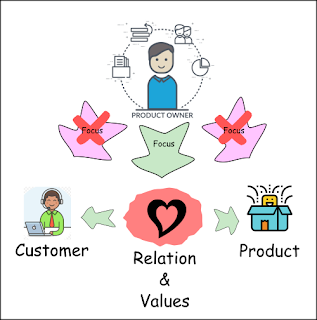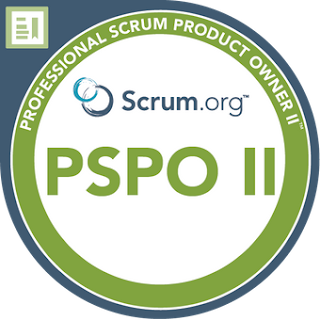Welcome back my friends! Today we are going to cut the "product" in two !
In our series of exploring the Product Owner profile (to not call it a role), in the context of my certification process at scrum.org, I want to share with you today one personal reflection that I had when I was studying for the assessments:
In Scrum: the Product, is not a Product
This is the point why I believe / understand that a Product Owner is not a "Product Manager".
And I can bet, that in the future, this accountability will be renamed in the scrum guide, because both words creates confusion. The word "product", and the word "owner".
...but let's focus on the point...
I have had an "aha" moment, while making an assessment, with an important question:
"when should a Product Owner decide to split the product into two products?"
The point behind this discussion, arrived to the conclusion that:
- If a Product is used by two different segments, in two different ways, then it should be split up into two products.
How to Split the Product into two
Of course, we are not talking about taking a handsaw, and saw the product by the half. The product, as device, remains intact, the same. Maybe we could change aspect or colors, if each segment has different culture or age. But the "physical product" is the same.
- The physical product is the same, but now we have two "product backlogs"
- ...then is it possible to assign these backlogs to two different Product Owners?
- Bingo! yes, of course.
Beautiful question. In this situation, I think, that the PO is owning a "value channel", that represents the relation between the customer and the product. When two different channels appears, then two backlogs and POs are needed. Its also possible that one PO can handle both backlogs.
There is no product without a customer. There is no customer without the product. It's a co-related unity "customer-product" (Maturana smiles back). This is a systemic perspective.
This unity, I think, is what the PO is owning. Is where its accountability focus on.
That's why makes non-sense to have a "product manager", or "customer relation manager"...
That's why the PO is not a user story writer.That's why the PO is not a product manager.
That's why is not about "customer centricity".
That's why is not about "product experts" or "technology experts".
Is not about "experts" at all.
It's about user experience. Customer impact, as value.
It's about empiricism focused on the customer-product relation.
Not in the product, not in the customer.
The Product Owner as a "Value" expert.
This way, the PO become an expert in "value", and "value" is the impact relation between customer and product artifact. The "product artifact", then, is the "vehicle" where value is transported.
What you think? I love disagreements and divergent ideas. Please share with everybody.
I hope to read you soon, and keep connected!
Happy "aha" moments,
Daniel
PS: a big thanks to Scrum.org and Joel Francia Huambachano for such a golden standards.






No comments:
Post a Comment